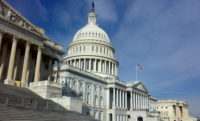As the search continues for alternatives, or supplements, to the gas tax, the Federal Highway Administration has awarded grants to seven projects in five states to test new types of charges for motorists and other highway users that could help finance road construction and maintenance.
The winning proposals, which FHWA announced on July 9, will receive a combined $15.1 million. They represent the latest round of Surface Transportation System Funding Alternatives (STSFA) grants.
Congress created the funding-alternatives competition in the 2015 Fixing America’s Surface Transportation, or FAST, Act and authorized $95 million over five years for the program. The federal grants are to account for no more than half of a project's cost.
Counting the new batch of grants, FHWA has provided a total of $40 million to 10 STSFA projects so far. Applications closed on July 10 for another round of STSFA grants.
FHWA said in a statement emailed to ENR that the reason why total grants thus far fall far short of the amounts authorized is that US DOT "did not receive a sufficient number of qualifying applications to expend all the award funds."
The agency said, "The STSFA program represents an innovative strategy that most states are just beginning to explore."
FHWA also noted that the program has a 50% nonfederal matching-fund requirement. That may have deterred some states from applying.
Washington State's Plans
The largest grant in the new round is $5.5 million to the Washington Dept. of Transportation and Washington State Transportation Commission for a road usage charge project.
Reema Griffith, the state transportation commission's executive director, says the latest grant application is part of a seven-year effort and follows a road-use charge pilot program that extended for 12 months and involved 2,000 drivers statewide. It was a simulation; no actual money was collected.
That test program led to a report that the commission issued in January. It recommends a small-scale program involving hybrid and electric vehicles as well as the state's vehicle fleet. Those categories would encompass about 4% of total vehicles in Washington.
The report states that this envisioned targeted program would be "the first step in a 10-to 25-year transition away from gas taxes to fund the state highway system."
"We learned a lot," Griffith says, "But there's still a lot of unanswered questions and areas that require a deeper dive, if you will, if we contemplate shifting from a gas tax to a road usage charge."
She adds that the new FHWA grant "is going to allow us to really dig into some specifics that are going to be very important to iron out as we think about scaling a program for an entire state fleet of over 6 million vehicles."
Among those specifics are reducing the cost of collecting the new user charges, which is much higher than for the gas tax, Griffith says. Another topic, she adds, will be the "potential disparate impact" a shift from a gas tax to a user charge might have on communities of color and low-income populations.
Privacy, the commission report says, "remains drivers' top concern."
Griffith notes that Oregon and Utah—which also won new STSFA grants—are the only states that are "collecting real money" from road usage charges, though on a limited scale.
Oregon's Projects
Oregon DOT, long a leader among the states in exploring alternative highway user fees, received two grants. The larger one, amounting to $5 million, will help finance a $10-million plan for road user charges “in a connected vehicle ecosystem.”
In its application to FHWA, ODOT notes that connected vehicles—in which vehicles, roads and smartphones can “talk “ to each other—are growing in use. The U.S. DOT sees connected vehicles as a way to improve safety. It says that they can reduce highway fatalities by more than 1,000 per year.
The ODOT project will investigate another possible benefit from connected vehicles. The department says the new project will examine “the feasibility of revenue collection using telematics data” from a connected vehicle system.
ODOT says that its past pilot projects dealing with road user charges have shown that “on-board telematics data from vehicles will be the most reliable and accurate way to report mileage and fuel usage.”
The application includes a proposed timeline of about three years for the project.
ODOT also was awarded a $250,000 STSFA grant on behalf of an 11-state western consortium. It will go for a project to investigate road use charges and blockchain.
Delaware, I-95 Coalition and Utah
Delaware DOT, on behalf of the Interstate-95 coalition, was awarded $3.35 million, for a project that aims to address barriers to mileage-based fees by expanding the deployment of the coalition's other pilot projects using such fees.
The coalition, which includes 17 states and the District of Columbia, has had pilot programs involving passenger vehicles and trucks.
Delaware Transportation Secretary Jennifer Cohan said in a statement, "With this grant funding, we can expand our evaluation of mileage-based user fees to additional Eastern states and take a more in-depth look at our findings from the pilots we conducted over the past three years."
Utah DOT is receiving two grants, totaling $645,000, for projects involving integrating road user fees with express-lane tolls.
Wyoming DOT is getting $250,000 in STSFA funds for a a truck-mileage-fee pilot project.
The increases in fuel-efficient vehicles and hybrid and electric vehicles have sparked the hunt for alternatives to federal and states’ gasoline and diesel taxes.
On the federal side, those trends have weakened the Highway Trust Fund and led to substantial transfers from the general fund to shore it up.
Those working on road-use charge concepts are aiming at a moving target, as new types of vehicles, technologies and payment methods emerge.
Griffith says, "I mean things are shifting so quick at our feet that we're trying to re-re cast what road charging means in these different scenarios."
Story updated on 7/10/2020 with additional information from FHWA and Delaware





